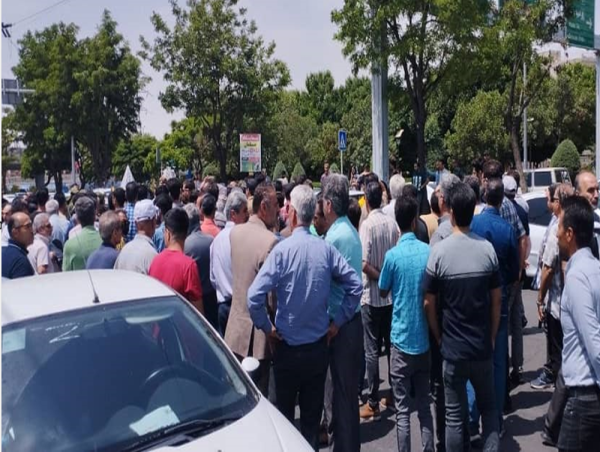The latest developments underscore the mounting pressures on the Iranian regime as it faces persistent economic challenges and widespread unrest.
Since June 19, more than 8,000 oil-sector workers have gone on strike across 65 sites in Iran, protesting against low wages, poor working conditions, and the lack of job security.
This strike, which has grown significantly, now includes workers from the Iranian Offshore Oil Company, Mahshahr Oil Refinery, and several other key oil and gas facilities. The striking workers are demanding higher pay, better working conditions, and the implementation of a schedule that allows 14 days of work followed by 14 days of rest.
The Council for Organizing Protests by Oil Contract Workers (Arkan-e Sales) reported that the strike aims to eliminate contractors from the oil and gas sectors, secure wage increases, and ensure safer working conditions.
The council highlighted that over 3,000 contract workers from 25 companies have joined the strike, emphasizing the need for uniform wages and conditions akin to official oil industry employees.
In Rafsanjan, southern Iran, retirees of the Rafsanjan Copper Company rallied in front of the pension fund office on June 22 to protest against unpaid arrears and the authorities’ failure to address their basic needs.
The retirees, many of whom have not received their pensions for months, expressed their frustration and demanded immediate action from the government.
Simultaneously, in Tabriz, northwestern Iran, landowners of the Khavaran 2 town rallied in front of the provincial governorate, protesting 12 years of governmental indecision regarding their land rights.
The demonstrators called for swift resolution of their issues, pending for over a decade.
The scope of worker protests is not limited to the oil sector. Reports indicate that workers from various industries, including telecommunications, education, and municipal services, are increasingly voicing their demands.
According to the state-run ILNA news agency, the delay in eliminating contractors and the failure to convert temporary contracts into permanent ones have fueled a new wave of protests among project-based and continuous project workers in southern Iran.
The regime’s response to these protests has been mixed, with some officials acknowledging the workers’ grievances while others resort to threats. Alireza Mirghafari, a member of the Supreme Labor Council, revealed that protesting workers have received threatening text messages from contractors, warning them against continuing their strike.
This development comes amid broader concerns about the regime’s ability to address workers’ demands. The government’s reluctance to implement the “Staffing Plan,” which aims to regularize temporary workers’ employment, has further exacerbated tensions.
Powerful contractor lobbies are believed to be stalling the plan’s approval by the Expediency Discernment Council, fearing a loss of their lucrative contracts.
Worker protests in Iran have been on the rise in recent years, driven by delayed wage payments, low salaries, layoffs, and privatization. An article in the newspaper Etemad on June 21 detailed that thousands of miners in coal, copper, iron ore, and chromium mines across various provinces have staged protests to demand their legal rights.
The report noted that out of 12 major miners’ protests in the past 27 months, 10 were centered around wage increases and delayed payments, with coal miners being the most significantly affected.
The ongoing strikes and protests across Iran reflect deep-rooted economic and social issues. As the regime struggles to manage these growing demands, the situation highlights the critical need for groundbreaking change in the country.
Oil sector workers across Iran initiated strikes demanding higher pay, job security, and the implementation of a 14-days-on, 14-days-off work schedule. These strikes are particularly notable given oil rig workers' harsh working conditions.
Workers on Lavan Island, part of the Iranian Offshore Oil Company, resumed their protests, emphasizing unmet demands for changes to wage determination policies, management overhaul, and other basic needs.
Similar strikes were reported among project workers in several oil companies, including those in Esfahan, where workers at the Sepahan Oil Project walked off their jobs.
The Council for Organizing Oil Contract Workers (Arkan Sales) reported that project workers had previously warned they would protest if their demands were not met by the end of June.
Consequently, workers from companies like Dasht Abbas, Samin, and Zamanpour Scaffolding Contractors began their strikes on June 20, demanding increased wages and the 14/14 work schedule.
According to reports, additional protest nuclei are forming across various project sectors. These workers are calling for eliminating contractors and insisting on equal wages and working conditions for all oil and gas industry employees, regardless of their employment status.
The unrest extended beyond the oil sector. Project workers at the Salman Farsi Petrochemical Plant joined the strike, demanding similar conditions.
Telegram channels associated with labor and retiree unions reported that workers from 30 companies in refineries, petrochemicals, and other oil, gas, and power facilities, mainly in southern Iran, handed over their tools and went home.
More than 3,000 workers have reportedly joined the campaign, pushing for eliminating contractors, ensuring job security, the 14/14 work schedule, and wage increases.
On June 20, Health Ministry retirees gathered in Tehran to protest the regime’s anti-human and plundering policies. They chanted slogans demanding the resignation of incompetent officials, reflecting their frustration with the government’s handling of economic and social issues.
In a report published on Thursday, June 20, the state-run newspaper Etemad highlighted that “an examination of labor protests over the past 27 months, from the beginning of 2022 to June of this year, shows that during this period, thousands of coal, copper, iron ore, and chrome miners in the provinces of Kerman, Mazandaran, Yazd, Razavi Khorasan, South Khorasan, and Semnan have held protests ranging from a few hours to several days and weeks, demanding their legal rights.”
The report further noted, “Of the 12 labor protests by miners during these 27 months, 10 protests centered on wage increases and several months of delayed payments. The lines of protesting coal miners were notably longer, indicating that the exploitation of underground miners’ rights is more widespread.”
On June 20, Health Ministry retirees in Tehran held a protest against the regime’s policies in front of the Retirement Fund office. The demonstrators called for the resignation of the regime’s authorities.
Meanwhile, in a stark display of the regime’s brutal tactics, security forces in Zahedan violently attacked and demolished the home of a marginalized Baluch family on June 19.
The homeowner described the assault, which involved around 100 armed officers arriving in 50 vehicles at 5 AM. The family, including five children, was forcibly evicted, and the house was destroyed. The authorities demanded a payment of 30 million tomans to avoid demolition, which the family could not afford.
The strikes and protests over the past few days underscore the widespread discontent among various sectors of Iranian society. These actions reflect growing frustration with the regime’s inability to address economic hardships and systemic corruption.
Amid this backdrop, Iranian officials continue to insist on the importance of voter turnout in the upcoming elections, portraying it as a means to counter their insolvable domestic and international challenges.
However, the ongoing protests and strikes paint a different picture, one of a populace increasingly disillusioned with the status quo and willing to take to the streets to demand change.
Furthermore, on June 20, The People’s Mojahedin Organization of Iran (PMOI/MEK) Resistance Units continued to commemorate the anniversary of the 1981 massacre, where the regime’s security forces opened fire on a peaceful protest by over 500,000 PMOI supporters and members.
This day marked the beginning of the all-out resistance against the mullahs’ regime. Since then, the regime has executed and killed more than 120,000 members of the Iranian Resistance.
If you wish to receive the NCRI weekly Newsletter, please use the following link to subscribe: https://bit.ly/3SMgEla.
Shahin Gobadi
NCRI
+33 6 61 65 32 31
email us here
![]()






